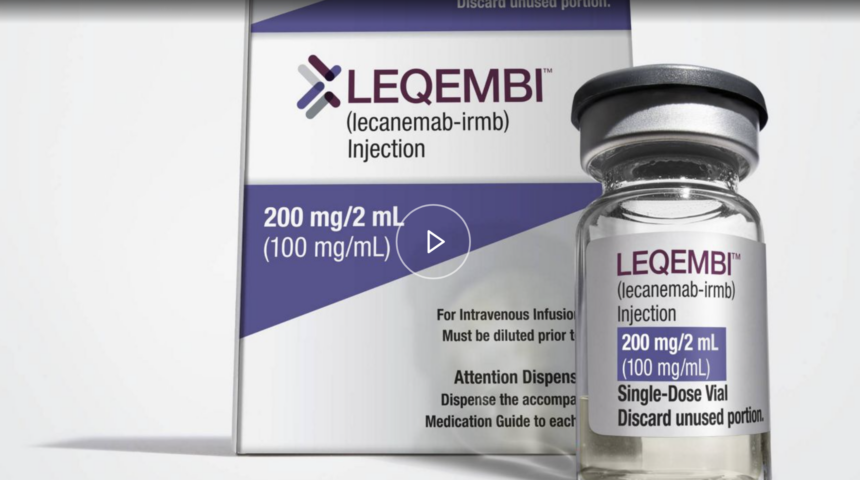The efficacy of a new Alzheimer’s drug is under scrutiny after it was granted accelerated approval by the Food and Drug Administration this month.
Leqembi, a treatment developed by Japanese biotech company Eisai and American biotech Biogen, has demonstrated more success in trial studies than any Alzheimer’s drug before. A recent study published in the New England Journal of Medicine—co-authored by researchers from Eisai— found the drug slowed cognitive decline in early-stage Alzheimer’s patients by 27%.
“We have a small win, a modest win, but it’s a win still,” said Marwan Sabbagh of the Barrow Neurological Institute, a paid consultant of Biogen, according to the Wall Street Journal.
Kelli Kazmier, assistant professor of chemistry and biochemistry at Hillsdale, said she isn’t convinced the drug is the game changer companies claim.
“Preliminary evidence suggests that there are small but significant changes in disease progression,” Kazmier said. “However, these are smaller than the burden that is typically associated with what you would need to meet to call an effective drug.”
According to Kazmier, an important differentiation is “statistical significance” and “therapeutic significance.”
Statistical significance states how certain researchers are of a trend, whereas therapeutic significance states whether or not a treatment accomplished a certain goal.
On a 18-point scale testing cognitive ability, researchers set a .5 point difference between the treatment group and the placebo group as the measure of success. The study found a .4 point difference, which fell short of their standard for therapeutic significance.
This explains why Biogen said the results showed a “highly statistically significant reduction of clinical decline.” The company didn’t say the drug has a significant effect on cognitive function – they say their certainty in its effect, however small, is significant.
The same study also signaled the drug carries risk of bleeding and swelling in the brain. About 17 percent of patients receiving Leqembi experienced brain bleeding, versus only 9 percent taking a placebo. About 12 percent of Leqembi patients experienced brain bleeding, compared with about 2 percent in the placebo group.
These numbers are an improvement over side effect risks of Aduhelm, Biogen’s previous drug approved by the FDA in June 2021. Forty-one percent of patients in Aduhelm trials experienced brain bleeding or swelling.
Liz Essley Whyte, who covers the intersection of the life sciences and Washington for the Wall Street Journal and Hillsdale alumna, told the Collegian the drug uses the same technique as many previous treatments.
“They all have the same kind of mechanism of action,” Whyte said. “Meaning they’re all trying to attack amyloid plaque in the brain to fight Alzheimer’s.”
Almost all of Alzheimer’s research and drug development over the past two decades has been focused on attacking plaques and tangles in the brain that many believe are the root cause of cognitive decline. But Kazmier said she believes these efforts may be mistaking an indicator for a cause.
“My take on these drugs is that there might be some small neurotoxic effect associated with the proteins that this drug would alleviate,” Kazmier said. “But the vast majority of the effects of Alzheimer’s disease and cognitive decline would not be affected by breaking up these plaques because it is not addressing the root cause of the issue.”
Even if Leqembi does prove to be marginally effective, it could be doomed to unprofitability if Medicare refuses to cover its cost. Experts say the drug would be cost-prohibitive to Medicare beneficiaries if they were forced to pay out of pocket.
“Without Medicare coverage, this drug is pretty much unaffordable. Even with Medicare coverage, beneficiaries would still be responsible for 20% coinsurance, and that’s not a trivial amount,” said Tricia Neuman, executive director of the Kaiser Family Foundation, according to CNBC.
Such was the fate of Biogen’s drug that flopped last year: Aduhelm. The FDA approved the treatment, but Medicare refused to cover it. One reason: Aduhelm, priced at $72,000, would have increased the cost of Medicare by $29 billion in its first year of coverage, according to a Kaiser Family Foundation report.
Whyte said this refusal by Medicare to cover Aduhelm made it inaccessible for most American seniors.
“It was a really rare and pretty shocking move when they decided not to cover Aduhelm routinely,” Whyte said. “That just made it really an impossible equation for most families that would try to get drugs.”
But the new drug’s promising results suggest its fate may be different. Trials studying Aduhelm didn’t show a slowing of cognitive decline, and Eisai said it would price Leqembi at a much lower $26,500.
Medicare is expected to make its decision in the coming months, according to Forbes, as the FDA considers full approval of Leqembi.
![]()

